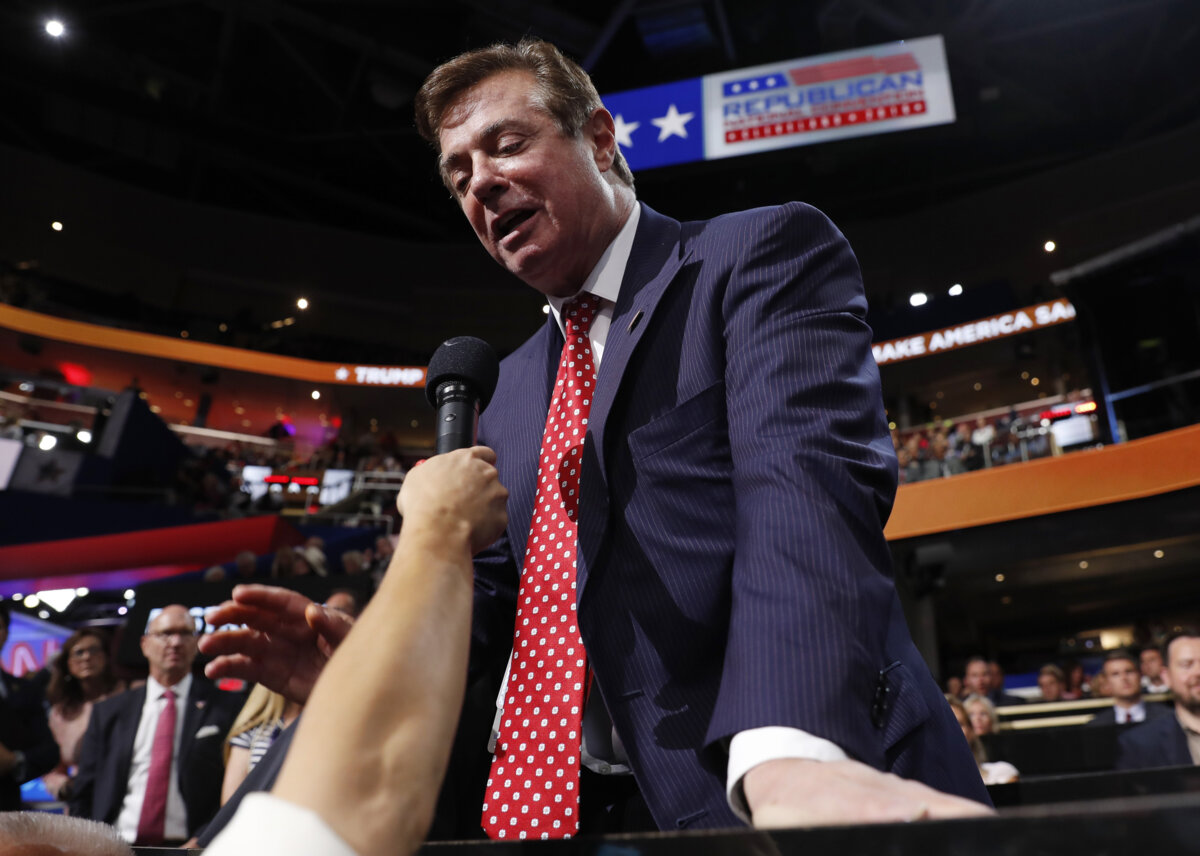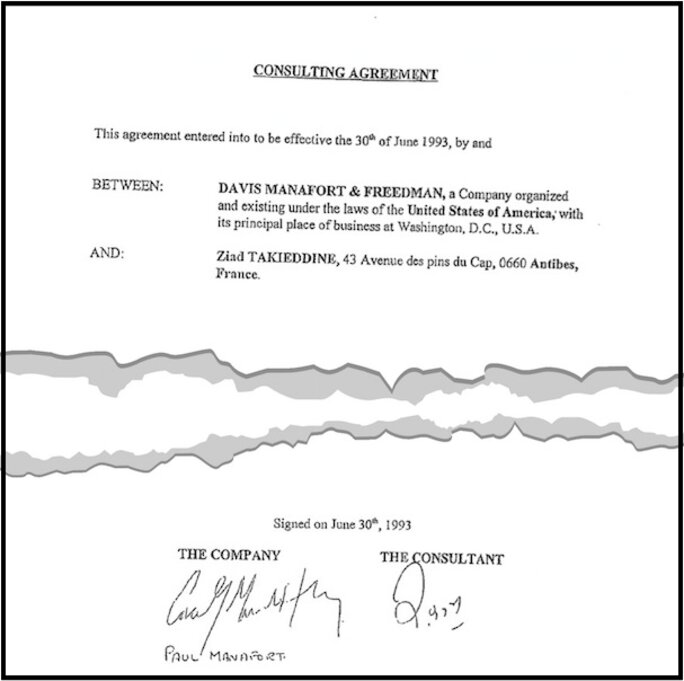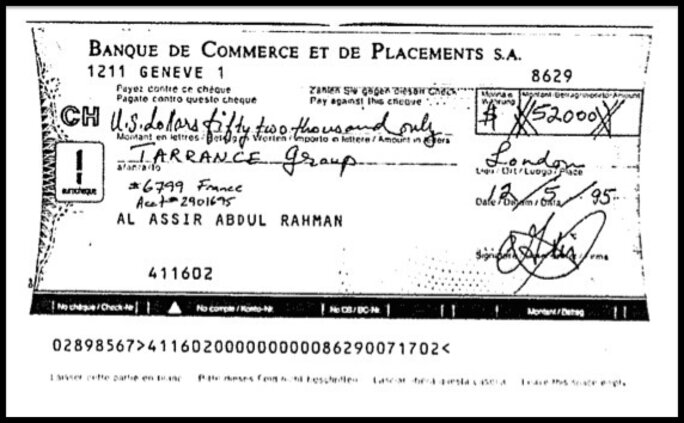Political consultant and lobbyist Paul Manafort, 67, who was earlier this year appointed as manager of Donald Trump’s presidential campaign, has a long CV of serving political heavyweights and controversial foreign leaders. Along his path as a political advisor, he worked with the presidential campaigns of Gerald Ford in 1976, Ronald Reagan in 1980 and George H.W. Bush in 1988.
But he also offered his services to former French prime minister Édouard Balladur, when the latter launched a bid for the French presidency in 1995. A French judicial investigation into suspected corruption involving the financing of Balladur’s campaign has detailed Manafort’s links to two arms brokers at the heart of the affair, Ziad Takieddine and Abdul Rahman Al Assir.
The case is part of what has become known in France as the Karachi Affair, which involves secret cash sums from kickbacks paid during French naval weapons sales to Pakistan and Saudi Arabia which are suspected of being used to illegally fund Balladur’s 1995 campaign (see a video presentation of the Karachi Affair here).

Enlargement : Illustration 1

Manafort introduced Takieddine and Al Assir to contacts in Pakistan, and subsequently received 272,000 dollars paid into different bank accounts between 1994 and 1995. The French judicial investigation also suspects that Manafort signed a fictitious contract with Ziad Takieddine so that the latter could recover cash which French customs confiscated from him during a search of his car on the Franco-Swiss border in July 1994. The search found 500,000 French francs (then the official currency, equivalent to about 76,000 euros), stashed in a plastic bag and hidden under his seat, and which he had shortly before withdrawn in Geneva.
“Shortly after the customs control, Mr Takieddine, who tried to falsely justify the origin of the 500,000 francs, had called on the services of Mr Manafort who gave him a false attestation,” wrote Paris-based Judge Renaud Van Ruymbeke in October 2012, in the case notes of the ongoing French investigation led by Van Ruymbeke alongside Judge Roger Le Loire.
In fact, the cash was a just a small part of the secret sums siphoned off from the arms deals signed by the Balladur government.
On July 28th 1994, at around 11p.m. Takieddine was stopped by customs officers as he entered France from Switzerland in a hired car. “That day he had withdrawn cash from one of the accounts of his associate, Mr Al Assir,” the investigation noted, and which “came from commissions linked to arms sales”.
Takieddine had pretended that the money was from a contract he had signed on June 3rd 1993 with the company Davis Manafort & Freedman (see document below) to act as its representative with the Pakistani health ministry.

Enlargement : Illustration 2

The French investigation details that Takieddine “produced the copy of an amendment of this contract, dated October 7th 1993, which allowed for fees of 1,600,000 francs payable [editor’s note: by Manafort’s firm] over a timetable that expired on February 28th 1995”.
Apart from the unlikely scenario that an arms dealer would be employed on a mission with the Pakistani health ministry, Takieddine’s former British wife, Nicola Johnson, told the French magistrates leading the investigation that her then-husband had never met with Manafort before the couple set up home in Paris in September 1993. In her statement to the magistrates, Johnson said the contract Takieddine had produced was therefore “a forgery, backdated”.
Paul Manafort did not respond to Mediapart’s attempts to contact him.
The current presidential campaign manager for Donald Trump is a longstanding friend of Abdul Rahman Al Assir, the other intermediary involved in the Balladur government’s weapons sales abroad. Whereas Ziad Takiedding had had until 1993 a comparatively modest career, latterly as manager of the Isola 2000 ski resort in the French Alps, Al Assir had in the 1980s led the Triad group owned by Saudi businessman and arms dealer Adnan Khashoggi, once described as the world’s richest person. Al-Assir had married Khashoggi’s sister Samira.
Implicated in the Iran-contra affair, Khashoggi’s fortunes faded and he sold his yacht, named Nabila, after his daughter, to Donald Trump, who renamed it Trump Princess before selling it on to a Saudi prince.
Manafort, meanwhile, was active as a lobbyist for foreign rulers, including Philippine president Ferdinand Marcos and the dictator Mobutu Sese Seko, president of Zaire. “Paul Manafort is the godfather of my son,” explained Al Assir in a statement to the French investigation. “I was introduced [to Manafort] in 1986 or 1987 by a former member of the US National Security Council who worked for me. […] I remunerated Paul Manafort for advice that he gave me concerning North American politics. He had been very active for the election of Ronald Reagan.”
Manafort was behind Al Assir’s contacts in Pakistan, where the arms broker went about concluding, as of 1993, the sale by France of three Agosta-class submarines. “Paul Manafort introduced me to Benazir Bhutto at the beginning of her mandate as prime minister of Pakistan in 1988,” Al-Assir told the French investigation. He claimed that Bhutto had wanted Manafort to make contact on her behalf with the ruling Republicans in the US and “with Saudi Arabia with which she wished to reestablish links”.
Al Assir intervened in the contacts made with the Saudis, helping to arrange for the Pakistani prime minister to meet with Saudi king Fahd in Mecca in July 1990. Al Assir had helped Bhutto with political contacts not only in Saudi Arabia but also in Morocco and Spain, and what he called “the supply of civil equipment by Spain to Pakistan” which was financed by the Spanish government.
After serving as Pakistan’s prime minister from 1988 to 1990, Bhutto returned a second time as prime minister from 1993 to 1996. During that second mandate, it was in France that the arms dealers found lucrative business opportunities.
'They proposed doing for Balladur what they did for Bush'

Enlargement : Illustration 3

Thanks to Takieddine's French political contacts via a regular guest at his ski resort, the then newly-appointed defence minister François Léotard, and also Al Assir's contacts in Pakistan, they were able to sign the contract to sell the Agosta submarines. The two arms dealers went to Islamabad to meet Bhutto and her husband, businessman Asif Ali Zardari, who would become Pakistan's president in 2008 after his wife's assassination.
In the summer of 1994, Al Assir rented a yacht, the Rosen Kavalier, for a meeting with Zardari. During the meeting, a close financial relationship was forged with Zardari, who would later be nicknamed “Mister 10 %”, a reference to the illegal commissions he is suspected of having raked in on numerous government contracts.
Investigations in Switzerland and Britain would reveal the transfer of large sums of money from Al-Assir's accounts to the accounts of Bhutto and Zardari. In France, the weapons sales deal signed by the Balladur government triggered payment of the equivalent of 54 million euros in commissions to three of Al Assir's companies, Rabor, Tesmar and Mercor, in 1994 and 1995. The equivalent of nearly 32 million euros was paid in advance, just for the Pakistan contract.
For his part, Manafort received from Al Assir a total of 272,000 dollars between 1994 and 1995, paid into the accounts either of his company, BMSK (Black Manafort Stone and Kelly), or Tarrance Group, or his wife, Kathleen. It appears Manafort continued to give advice to Al-Assir.
"In 1994-1995 I paid Paul Manafort for his advice on US politics which I transmitted to King Fahd, sometimes directly, generally via Sheik Ali Ben Moussalem," Al Assir said in his statement to the French magistrates. "This was advice or analyses regarding people, institutions or political positions that had a direct impact for Saudi Arabia, notably the US relationship with Yemen. I stress that my various payments to Paul Manafort, his family and his company have absolutely nothing to do with Edouard Balladur's campaign."
Al Assir admits that he had "had the idea" of offering "the services" of the American lobbyist to the Balladur campaign. "I made this proposal via Ziad Takieddine, but he reported to me that it had been refused because they had what they needed in that area," he explained. Takieddine would have brought up this subject with Balladur's campaign director, Nicolas Bazire. He, however, said he had "no recollection" of it.
Manafort had in fact ordered two opinion polls from Tarrance, in which he is a partner, before making a proposal to the Balladur campaign team. And at least one of these polls was paid for by the arms dealer using cash from the commissions. From October 11th- 15th 1994 and from January 2nd- 7th 1995, a sample of 800 people was indeed polled by telephone. "I remember that Paul [Manafort] sent faxes to Ziad [Takieddine] in English and Ziad had to translate them to give them to the Balladur camp," Takieddine's ex-wife, Nicolas Johnson, told the French investigators in a statement.

Takieddine himself explained to the French investigation that he had met Manafort in late 1994 or early 1995, an implicit recognition that the contract between him and Manafort over dealings with the Pakistani health ministry must have been post-dated, or else a fake. "Al-Assir introduced me to him [Manafort] as being the person who had worked for the campaign of George Bush the father," Takieddine said in a statement to the investigation. "I met both of them at his home in Paris. They proposed to do for Balladur what they did for George Bush. I told them that I did not know what would be used by Balladur for his campaign, whether it would be advertising, opinion polls, political marketing etc. I suggested to them that I would talk to Mr Bazire about it. I went to see Mr Bazire a few days later. He said no. He already had, I think, Jérôme Jaffré."
Manafort had explained to Takieddine that he was in possession of the results of an opinion poll into Mr Balladur's chances of winning. According to Takieddine, "this in-depth inquiry did show that it was very likely he would win the election against Mr Chirac, and that he would even win during the first round".
Despite their optimism, these opinion polls barely raised eyebrows within the campaign team. The person in charge of opinion polls at the French prime minister's office, Matignon, had not heard of them either, and suggested "a parallel circuit". Manafort did not tell Takieddine if the poll had been paid for by Al Assir, but Takieddine "supposed" it was.
Takieddine added that he had later understood that "relations between Manafort and Al Assir were very deep”. He also alleged that "Manafort had bought a house in a smart neighbourhood of New York, financed by Al Assir”. To date, no investigation appears to have been undertaken to verify whether Takieddine's allegation is founded.
-------------------------
- The French version of this article can be found here.
English version by Graham Tearse and Sue Landau


